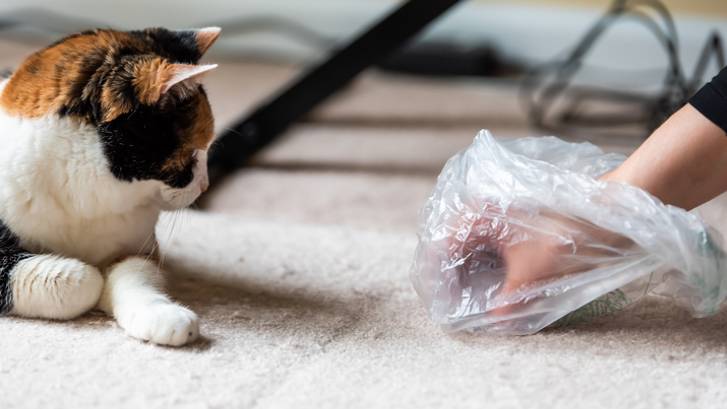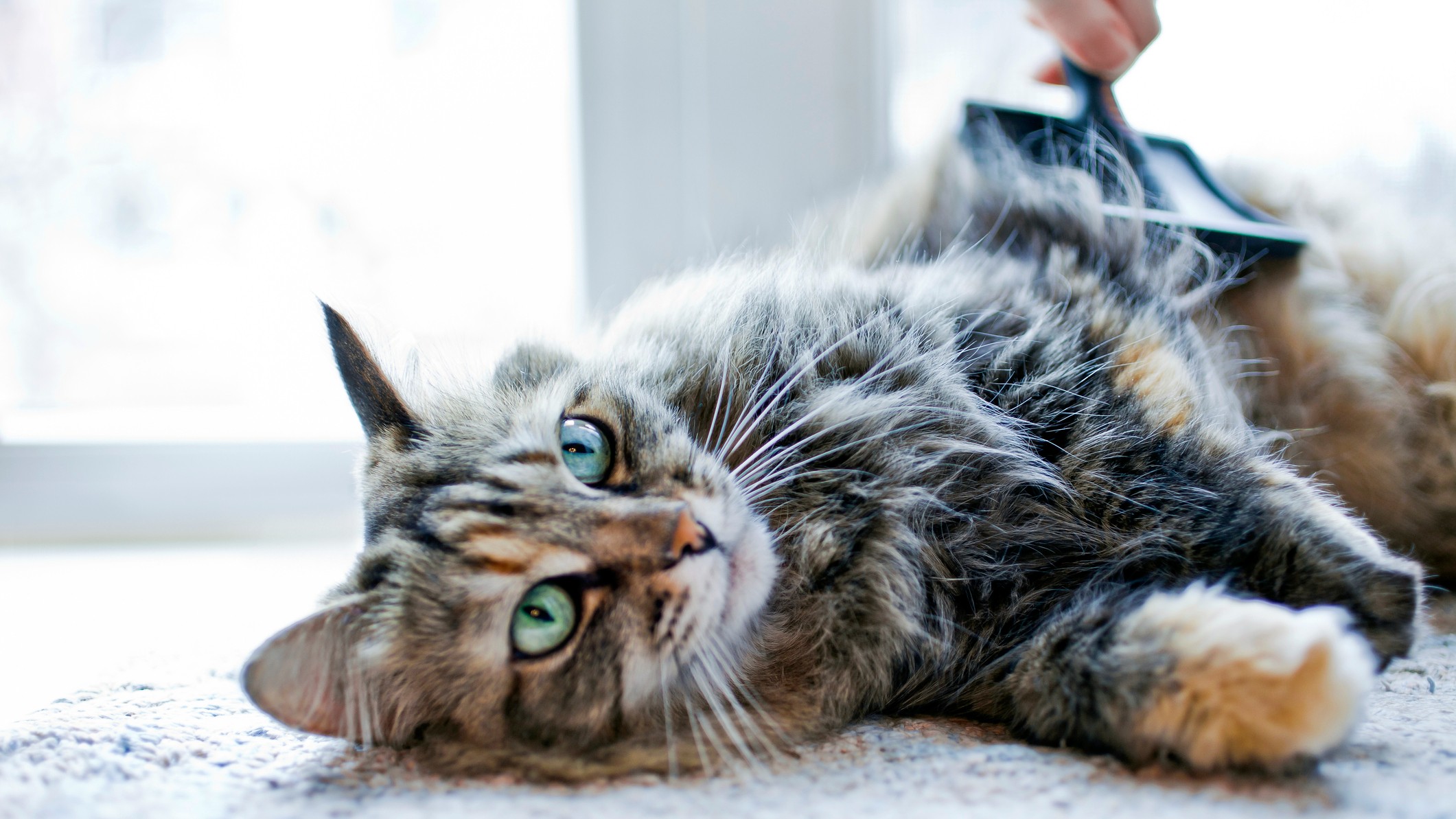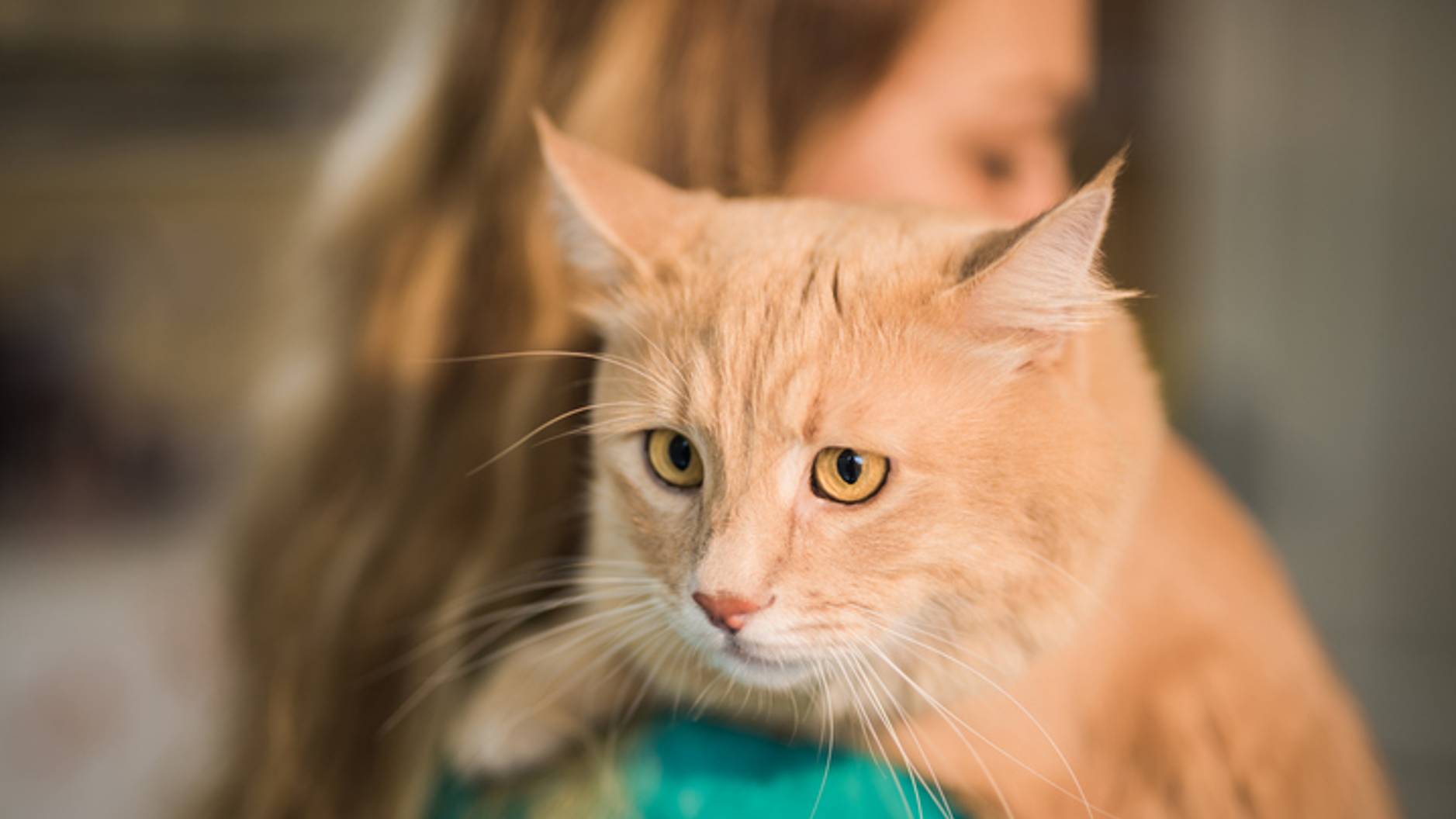Hairballs in cats: A vet's guide to causes and treatment
Know the signs and learn how to treat hairballs in cats with this veterinary guide

If you’re like most cat owners, nothing gets you out of bed faster than the characteristic sound of your cat hacking up a hairball in the middle of the night! Although hairballs in cats are typically normal and harmless, too many can be a sign of a problem for your feline friend.
If you’re tired of dealing with that slimy mess, don’t worry, there are steps you can take to stop hairballs once and for all. Read on to learn more about what causes hairballs in cats and what you can do to treat and prevent them at home, from investing in a good quality cat brush and regularly grooming your cat to over-the-counter remedies.
Symptoms of hairballs in cats
Hairballs are relatively easy to identify at home. If your cat is vomiting large slimy mats of hair, these are hairballs. Hairballs occur as a result of your cat’s normal grooming behavior. When your cat grooms, hair becomes caught in the barbs on cat’s tongue.
This hair is then swallowed and passes into the digestive tract. Some hair passes through the digestive tract and into the feces, while some hair accumulates in the stomach and is later expelled by vomiting. Hairballs are more common in long-haired breeds, but short-haired cats can experience them as well. Your cat may also be more prone to hairballs if he or she is over-grooming, which can occur due to anxiety, pain, or itching.
Treatment of hairballs in cats
Hairballs can be a disgusting nuisance, but luckily they are relatively easy to treat. Most hairballs can be remedied with over-the-counter hairball treatments. These products usually contain flavored petroleum jelly, which coats the hair that accumulates in the stomach and acts as a mild laxative to help it pass harmlessly through your cat’s digestive tract.
Many cats enjoy the taste of these flavored products and will lick them right off of your finger. If your cat is less inclined to eat the hairball treatment, try smearing a small amount on the inside of the cat’s paws so that they will have to lick it off to clean themselves, thus ingesting the product in the process.
In rare cases, hair accumulation in your cat’s digestive tract may become severe enough to cause a blockage, requiring hospitalization and surgery to address the problem. This is why it is important to stay on top of your cat’s grooming and prevent hairballs whenever possible.

Preventing hairballs in cats
The best way to prevent hairballs in your cat is through regular grooming. Grooming long-haired cats daily will help remove loose hair and prevent hairballs, whereas short-haired cats may only need to be brushed weekly or every other week depending on the cat’s grooming behavior.
If you can’t groom your cat at home, regular visits to a professional groomer or your veterinary clinic can help keep your feline friend looking sleek and shiny.The same petroleum-based medication used to treat hairballs in cats can also be given regularly as a preventive to help hair pass through the digestive tract without forming hairballs.
There are also many hairball prevention treats, chews, and diets on the market which use similar formulations to help hairballs move along your cat’s digestive tract. Your veterinarian is a great resource to recommend a product that can keep your cat hairball free.
When to visit the veterinarian
Hairballs are a common and normal occurrence in cats, but they shouldn’t happen more than once every week or so. If your cat is having frequent hairballs despite providing appropriate preventive care, it may be time to see your veterinarian.
Frequent hairballs can be an early sign that your cat is over-grooming, which can occur due to anxiety, pain, stress, itching, or certain skin conditions. It is especially important to visit your veterinarian if your cat’s hairballs are accompanied by any other symptoms, such as a loss of appetite, lethargy, diarrhea, or a change in behavior.
These symptoms can be a sign of a more serious condition, such as an intestinal obstruction, and should be addressed immediately. Similarly, if your cat is vomiting substances other than hair, it’s time for a trip to the vet to get to the bottom of the problem.

Is it a hairball or a cough?
Pet owners will often describe their cats as “trying to bring up a hairball” or having a hairball that is “stuck”. If your cat is hacking unproductively, it may not be hairballs at all! In many cases, this hacking is actually your cat coughing. Cats can cough for many reasons, including asthma, upper respiratory infections, pneumonia, and heart disease.
These are all much more serious conditions than hairballs, so it is important to see your veterinarian if you suspect your cat may be coughing. If your cat hacks as if he or she is trying to produce a hairball but never actually brings anything up, this is a sign that your cat may be coughing and should see a veterinarian.
Conclusion
Feline hairballs are more than just a messy nuisance; they can also be a sign of a problem! If your cat is having more hairballs than usual or has hairballs frequently, then it may be time for a visit to your veterinarian to look for underlying problems. The good news is that most simple hairball problems can be managed with regular grooming and over the counter preventive medications.
However, hairballs can become severe if left unmanaged, so it’s important not to let this hairy problem go untreated. Be sure to groom your cat regularly, and monitor your cat for any other symptoms, like lethargy, loss of appetite, or coughing, which could indicate a more serious problem than hairballs alone. As always, consult your veterinarian if you have any lingering concerns about your cats health or behavior.
PetsRadar Newsletter
Get the best advice, tips and top tech for your beloved Pets
Dr. Elizabeth Racine is a small animal general practice vet covering all things pet health and wellness. Her special interests include veterinary behavior, nutrition, and internal medicine.
As a freelance writer, Dr. Racine has written content for major companies in the industry such as the American Kennel Club, Merck Animal Health, Bayer PetBasics, Elanco, and CareCredit. In her free time, Dr. Racine enjoys playing trampoline dodgeball, hiking with her beagle Dasher, and spending time with her three mischievous cats.

